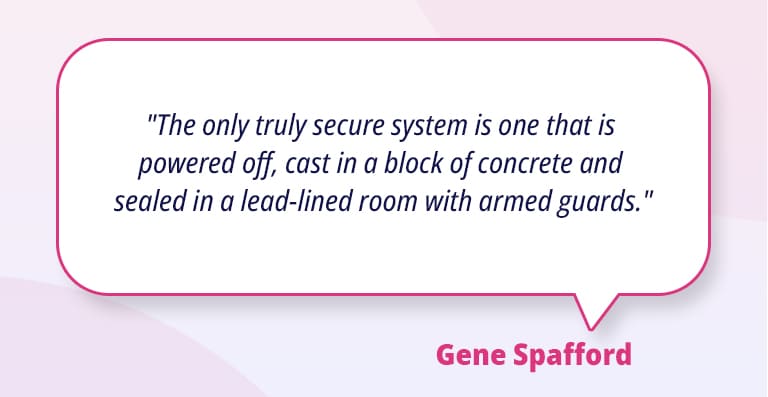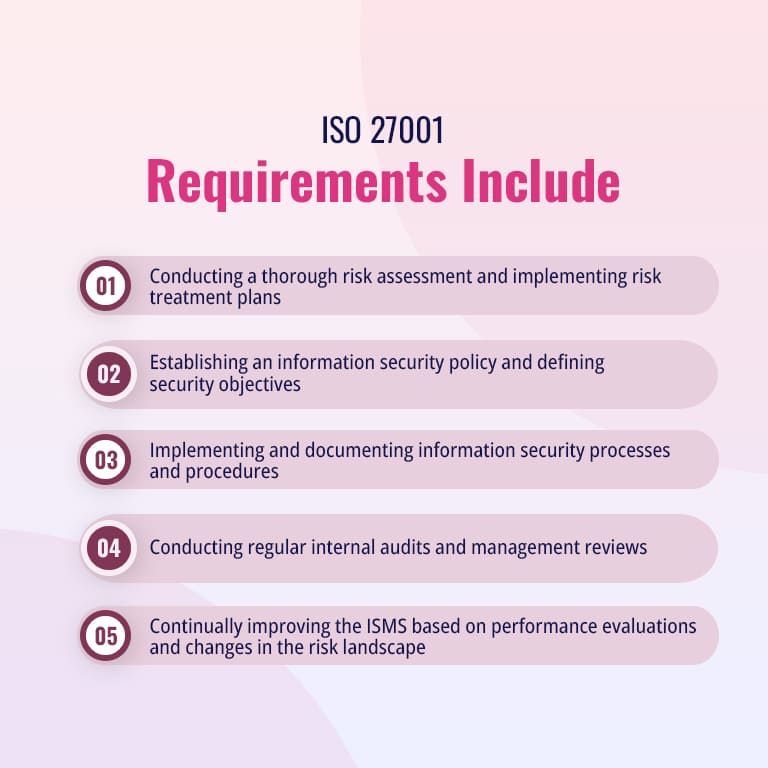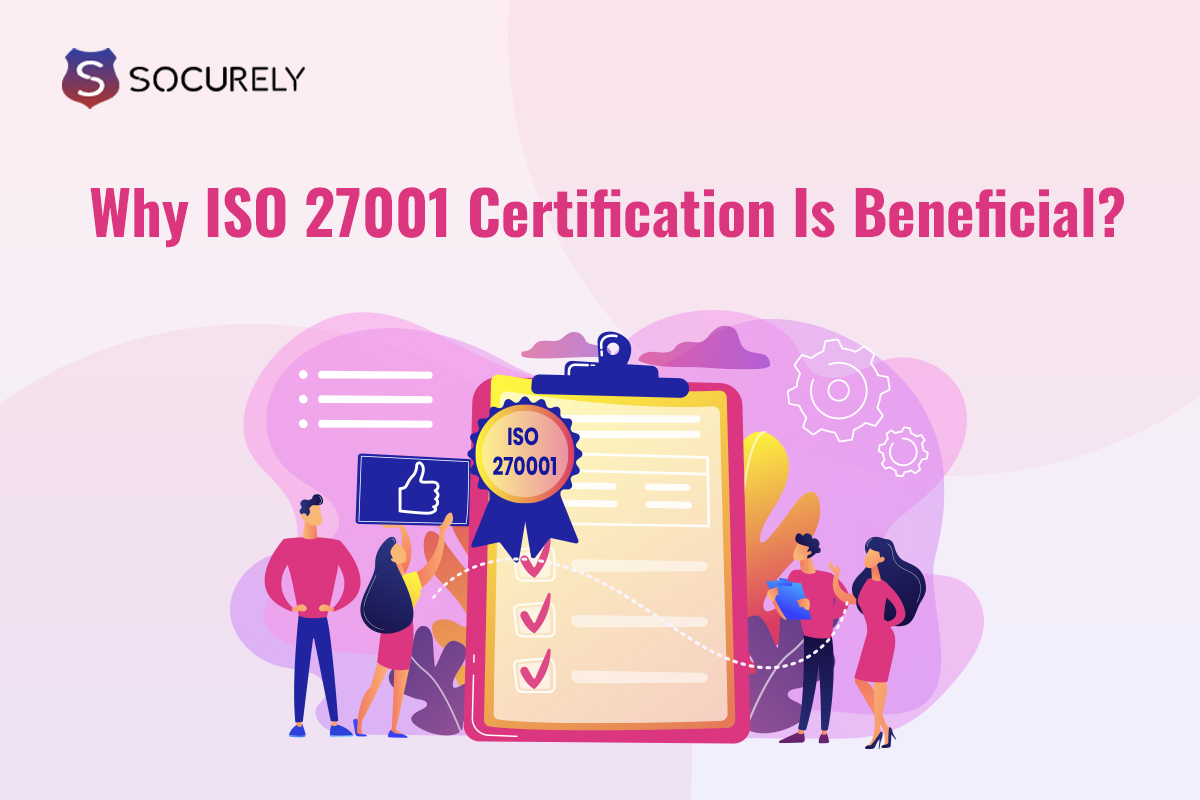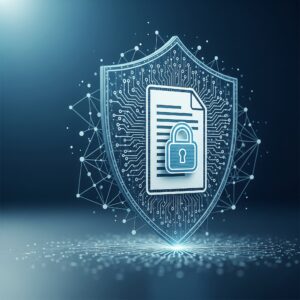
In today’s digitally interconnected world, the words of Gene Spafford resonate more than ever. The rapid evolution of technology has brought unprecedented opportunities for businesses, but it has also ushered in a new era of cyber threats and data security challenges. According to a recent report by IBM Security, the average cost of a data breach has soared to $4.24 million, highlighting the pressing need for robust information security measures.
You can strengthen the security posture and become more resilient and equipped to repel security breaches and cyberattacks with the aid of the ISO 27001 certification. Obtaining an ISO 27001 accreditation proves that your business adheres to the international information security best practices. Also, it claims that your data security procedures are trusted by your clientele.
From mitigating risks to building trust, ISO 27001 certification stands as assurance in an increasingly vulnerable digital ecosystem.
Let’s embark on a journey to explore why ISO 27001 certification is not just a choice but a strategic imperative for businesses worldwide.
What Is ISO 27001 Certification?
Data breaches and cyber-attacks can have devastating effects on businesses, leading to financial losses, tarnished reputations, and legal repercussions.
But do you know how to make sure your business is compliant? Here comes ISO 27001 compliance.
ISO 27001 is an international standard that outlines the requirements for establishing, implementing, maintaining, and continually improving an Information Security Management System (ISMS) within the context of the organization’s overall business risks. By ensuring confidentiality, integrity, and availability, it serves as a systematic way for businesses to manage sensitive information.
ISO 27001 certification is a globally recognized standard for information security management systems, designed to help organizations safeguard their sensitive information and mitigate security risks.
What Are The ISO 27001 Requirements?

ISO 27001 requires organizations to establish, implement, and maintain an ISMS. Here are the key components:
Risk Assessment and Treatment:
- Identify potential security risks and assess their impact.
- Implement measures to mitigate identified risks.
Security Policy:
- Develop and maintain a comprehensive security policy.
Organization of Information Security:
- The information security management process should be defined in terms of roles and responsibilities.
Asset Management:
- Inventory and classify information assets.
Access Control:
- Implement controls to restrict access to information.
Cryptography:
- Use encryption to protect data.
Physical and Environmental Security:
- Protect physical premises and equipment from unauthorized access and damage.
Operations Security:
- Ensure secure operations of information processing facilities.
Communications Security:
- Protect information in networks and data exchanges.
System Acquisition, Development, and Maintenance:
- Incorporate security measures into the business information systems.
Supplier Relationships:
- Manage security risks associated with suppliers.
Information Security Incident Management:
- Detect and respond to information security incidents.
Compliance:
- Adhere to legal and regulatory requirements.
Continuous Improvement:
- Regularly review and improve the ISMS.
Also read- A Comprehensive Guide To 2024 Requirements
What Are The Benefits Of ISO 27001 Certification?
Organizations must implement the ISO 27001 certification because it offers a globally recognized framework for information security management. Organizations demonstrate their commitment to providing sufficient privacy, integrity, and availability protection for their sensitive data by earning this certification. Adopting ISO 27001 is the best approach for the business to meet regulatory compliance obligations, rebuild stakeholder trust, and enhance its reputation.
-
Top Benefits Of ISO 27001 Certification-
According to a recent study by the International Organization for Standardization, organizations that implemented ISO 27001 reported a 45% reduction in security incidents.
Enhanced Information Security:
- ISO 27001 provides a systematic approach to managing sensitive information, reducing the risk of data breaches and cyber-attacks.
- According to IBM’s 2022 Cost of a Data Breach Report, the average cost of a data breach is $4.24 million. ISO 27001 can help mitigate these risks and associated costs.
Compliance with Legal and Regulatory Requirements:
- ISO 27001 helps businesses comply with various data protection regulations, such as GDPR, HIPAA, and others.
- It demonstrates a commitment to protecting sensitive information, which can be crucial for regulatory compliance and avoiding hefty fines.
Improved Risk Management:
- The standard requires a thorough risk assessment, helping businesses identify and manage security risks proactively.
- This proactive approach can prevent security incidents and minimize their impact.
Increased Customer Trust and Confidence:
- ISO 27001 certification signals to customers that a business is committed to protecting their information.
- This can enhance customer trust, leading to increased business opportunities and loyalty.
Competitive Advantage:
- ISO 27001 certification can differentiate a business from its competitors.
- It can be a decisive factor for clients and partners when choosing a company to work with.
Business Continuity:
- Implementing ISO 27001 can help ensure that any critical business operations can also be secured while maintaining the continuity.
- This resilience is crucial for maintaining operations and protecting the business’s reputation.
Cost Savings:
- By preventing data breaches and security incidents, ISO 27001 can save businesses significant costs associated with recovery, legal fees, and fines.
- Efficient risk management can also lead to lower insurance premiums.
Employee Awareness and Responsibility:
- ISO 27001 promotes a culture of security awareness and responsibility among employees.
- Regular training and awareness programs can reduce the risk of human error and insider threats.
Also read- ISO 27001 Compliance: Busting Common Myths & How It Helps Businesses?
Get Started With ISO 27001 Certification With Socurely
Embarking on the journey to ISO 27001 certification can be challenging, but Socurely is here to help. Our comprehensive services guide you through every step of the process, from initial assessment to implementation and continuous improvement. We provide expert advice, practical solutions, and ongoing support to ensure your ISMS meets the highest standards.
Conclusion
ISO 27001 certification is not just a mark of compliance; it’s a strategic investment in your business’s future. By implementing a robust ISMS, you can protect sensitive information, build trust with customers, and gain a competitive edge. Whether you’re a small business or a large enterprise, the benefits of ISO 27001 certification are significant and far-reaching.







